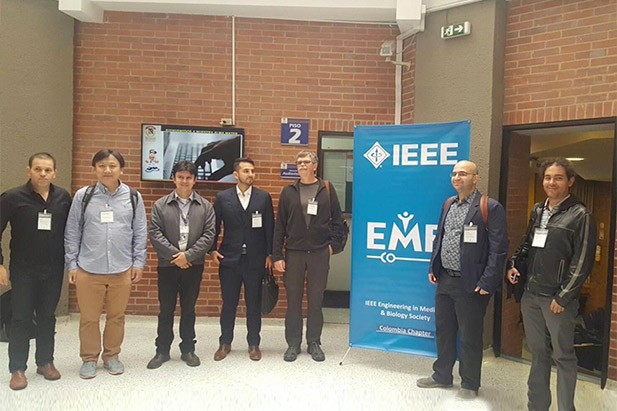FBIT researchers present medical app findings for serious games
Impact of human-like toys also explored at Colombian conference
November 17, 2016

While many video games are created for the sole purpose of entertainment, the game development industry also has a very serious side to it. Many games are designed for practical applications, such as teaching, by simulating real-life experiences, for example flight or medical operations.
So-called ‘serious’ games are serious business, especially for a group of researchers at the University of Ontario Institute of Technology (UOIT). Four faculty members from the Faculty of Business and Information Technology (FBIT) recently shared their latest findings at the 2nd Workshop on Engineering in Medical Apps at Universidad Militar Nueva Granada in Bogotá, Colombia:
- Pejman Mirza-Babaei, PhD (Games-user research in medical applications)
- Bill Kapralos, PhD (Serious gaming: Fidelity and multimodal interactions)
- Patrick Hung, PhD (Children’s privacy protection engine for smart anthropomorphic toys)
- Miguel Vargas Martin, PhD (Do brain-computer interfaces have a future in learning environments?)
The workshop brought together educators, scientists, engineers, students, enthusiasts and clinicians from across the Americas who are interested in the application of games, simulation and virtual reality in medicine. Other Canadian speakers included researchers from the University of Waterloo and York University.
UOIT participant summaries
Dr. Pejman Mirza-Babaei (opening keynote) has made significant contributions to the field of games-user research through his publications and advocacy for small independent developers and other groups that create games such as those with medical applications.
Dr. Bill Kapralos spoke on the application of sound in the enhancement of haptic (sense of touch) fidelity perception in serious games and the development of cost-effective simulations.
Using Mattel’s Hello Barbie as a case study, Dr. Patrick Hung examined the implications of smart anthropomorphic toys (toys with human characteristics) on children’s privacy, including the lack of regulations and the recent prevalence of humanoid toys connected to network and sensory technologies. Dr. Hung has published the first book dedicated to toy computing, which explores how technology influences and is used to augment smart toys.
Dr. Miguel Vargas Martin discussed the benefits and limitations of brain-computer interfaces using the example of a health-care simulation system designed and developed at the university. Dr. Martin has done extensive work in the field of virtual learning environments. His work has led to the development of Navdriver, a free web service and learning platform prototype tested at the university.
Other activities in Colombia
Researchers also visited the Medical Simulation Laboratory at Universidad Militar Nueva Granada to try different simulation equipment in the overlapping interests of serious games and medical applications. This workshop was co-organized by Alvaro Uribe, PhD, who recently completed a one-year post-doctoral fellowship at UOIT and the University of Waterloo’s Games Institute. Uribe’s fellowship was funded by the Social Sciences and Humanities Research Council of Canada under the Interactive and Multi-Modal Experience Research Syndicate network.



